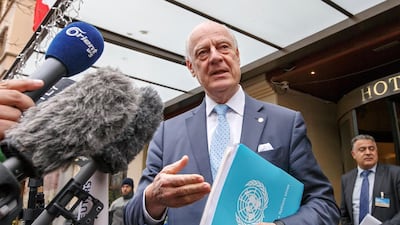The United Nations mediator in the deadlocked Syria peace talks urged the security council yesterday “to prepare reform proposals for agreement by the warring sides” to find a political solution to the crisis.
The eighth round of UN-brokered talks on Syria ended on Thursday with Staffan de Mistura forced to admit: “We did not have real negotiations.
“It is time for the UN to provide some specific elaborations on elections and constitution to stimulate a wider conversation,” Mr de Mistura said.
“The UN has provided electoral assistance to a majority of UN member states, so we do have experience.”
Mr de Mistura said that constitutional review and revision was essential, but that the “process must be Syrian owned and led, and the resulting constitution must be Syrian drafted”.
He said “that a calm and predictable environment would be necessary for a proper constitutional process in Syria”.
The envoy said he hoped the Geneva talks would at least result in some humanitarian progress despite his admission that “no progress was made on the humanitarian issues, nor was there any progress on the status of displaced persons”.
The talks, which began on November 28, remain deadlocked on the issue of the future of Syrian president Bashar Al Assad, with the opposition insisting he must be removed from power as part.
“The negotiations that we thought were ready to move forward did not move forward. This was an opportunity lost,” Mr de Mistura said. “I cannot hide my disappointment.”
As mandated by a security council resolution, the talks focused on governance, drafting a constitution and elections as the basis for a Syrian-led, Syrian-owned process to end the conflict.
Mr de Mistura said that resolution 2254 was “all we have” in terms of fashioning a political process moving towards UN-sponsored elections.
The resolution outlines a road map for a peace process in Syria, while setting a timetable for talks between government and opposition members.
It also seeks an inclusive and Syrian-led political process that meets the aspirations of the Syrian people as the only sustainable solution to the crisis in Syria.
The US called for renewed peace talks to be held in “Geneva as it is the only venue for a viable Syrian process”.
The security council, meanwhile, voted to renew cross-border aid deliveries to Syria’s opposition-held areas, but Russia, China and Bolivia abstained.
Russia demanded changes to the aid operation allowing convoys to cross into Syria from Turkey and Jordan without the approval of the government in Damascus.
Russian deputy ambassador Vladimir Safronkov said the situation in Syria had changed radically over the past three years and that cross-border aid was “a legacy of the past”.
“We think it is important to gradually draw down this rudimentary scheme that has worked for Syria division,” Mr Safronkov said.
The UN maintained that the cross-border deliveries are a lifeline to Syrians living in rebel-held territory because the government in Damascus has heavily restricted aid shipments to those areas. Yesterday, the International Committee of the Red Cross raised concerns about intensifying fighting in Eastern Ghouta, on the outskirts of Damascus, which the humanitarian organisation described as “taking an unacceptable toll on everyday life in the area”.
“The humanitarian situation in Eastern Ghouta has reached a critical point. As so often in Syria over the past six years, ordinary people are once again trapped in a situation where life slowly becomes impossible and where goods and aid are severely limited,” said the ICRC’s Middle East director, Robert Mardini.
More than 13 million people need aid, now that Syria is in its seventh year of war. Cross-border aid reaches one million Syrians a month, on average.


